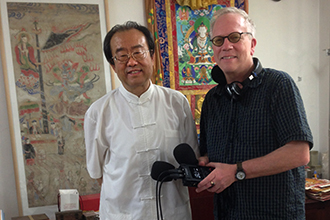Folklorist stirs up a cultural gumbo with China
Tulane University folklorist Nick Spitzer is taking his passion for authentic American music to China as part of a cultural exchange that contemplates the “intangible cultural heritage in both countries.”

On his most recent visit to China, Nick Spitzer, right, speaks with Tian Qing, head of the Chinese Music Institute, for an upcoming “Routes to China” radio program. (Photo by Qiaoyun Zhang)
Spitzer, professor of anthropology and American studies and producer and host of the “American Routes” radio program, traveled for the third time to China in June.
While there, Spitzer made a presentation comparing New Orleans and Shanghai jazz and spoke in Chengdu, which experienced a massive, deadly earthquake in 2008, about the role of culture in disaster recovery. He gave a keynote address to the American Culture Center directors about bringing community-based performing arts to China to represent American cultures through traditional jazz, blues, soul, Cajun, bluegrass and Native American music.
In Beijing, Spitzer met with Cultural Ministry officials and discussed “cultural creolization” with graduate students and faculty in a new program on ethnography at the Chinese Academy of Social Sciences.
The efforts built on a seminar at the School of Advanced Research (Santa Fe, N.M.) with leading Chinese and American thinkers about public folklore as intangible cultural heritage.
This month, Spitzer is serving as artistic director for a tour by the American cowboy band Wylie and Wild West that included participation in a festival for protecting the inner Mongolian grassland culture of horsemen and herders, and their traditional music.
Elements from these travels will be woven into an academic unit on cultural diplomacy and public folklore in China, a published collection of essays and additional visits to China. Spitzer is planning a “Routes to China” radio program for 2014.
“There is increasing attention in China to support cultural continuity and traditional creativity against the overheated rush to urbanization,” Spitzer says. “The American cowboy-meets-Mongolian horsemen encounter addressed our mutual concerns in both a critical and celebratory way. I expect our engagement and exchange with Chinese scholars, presenters, artists and Cultural Ministry officials will continue to grow.”
